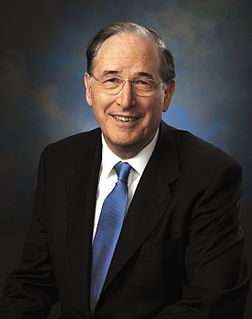A Quote by Bernie Sanders
I don't think any sensible person would disagree that the invasion of Iraq led to the massive level of instability that we're seeing right now. I think that was one of the worst foreign policy blunders in the modern history of the United States.
Related Quotes
Actually, if you look at the essence of ISIS, how it came about, it's the product of foreign invasion. Foreign invasion in Iraq led to removal of Saddam Hussein, and we're not unhappy with that, but the point is that foreign presence in any territory has created dynamics. And you cannot avoid those dynamics.
I think the President's decision to withdraw the United States, to keep a campaign promise in Iraq, without leaving a stay-behind force was a mistake, and I hear that from veterans in Wyoming and from parents who lost children fighting in Iraq. We're seeing it, though, around the world. When we, the United States leads a vacuum anywhere, that emboldens others to go in, when there is no sense of deterrence by the United States that lets bad actors move and fill the void.
Foreign policy always has more force and punch when the nation speaks with one voice. To remain secure, prosperous, and free, the United States must continue to lead. That leadership requires a president and Congress working together to fashion a foreign policy with broad, bipartisan support. A foreign policy of unity is essential if the United States is to promote its values and interests effectively and help to build a safer, freer, and more prosperous world.
In no circumstance would the United States or any other nation have the right to mount a military invasion to overthrow another government for the ostensible purpose of achieving disarmament. Rather, the United States would respect the Charter of the UN and would strive to achieve disarmament and settle the differences among nations through peaceful diplomatic means.
The entire Islamic world condemned Iran. Nowadays, because of the unwarranted invasion of Iraq by Bush and Blair, which was a completely unjust adventure based on misleading statements, and the lack of any effort to resolve the Palestinian issue, there is massive Islamic condemnation of the United States.
Now therefore, be it Resolved by the Fiftieth Annual Convention of the Veterans of Foreign Wars of the United States, That we hereby declare that we are unalterably opposed to any program which would entail the surrender of any part of the sovereignty of the United States of America in favor of a world government.
I think, while it is true that the Hillary Clinton and I voted differently on the war in Iraq, what is important is that we learn the lesson of the war in Iraq. And that lesson is intrinsic to my foreign policy if elected president, is the United States cannot do it alone. We cannot be the policeman of the world. We are now spending more I believe than the next eight countries on defense. We have got to work in strong coalition with the major powers of the world and with those Muslim countries that are prepared to stand up and take on terrorism.
The United States has weakened itself with Iraq; Iranians feel victorious - they feel capable of filling the void. I think from the very outset the nuclear issue has been secondary to the more strategic outlook, in which the United States has, since 1991, pursued a policy that it cannot permit any country in the region to become too powerful and challenge American hegemony.
We are apt to say that a foreign policy is successful only when the country, or at any rate the governing class, is united behind it. In reality, every line of policy is repudiated by a section, often by an influential section, of the country concerned. A foreign minister who waited until everyone agreed with him would have no foreign policy at all.
































